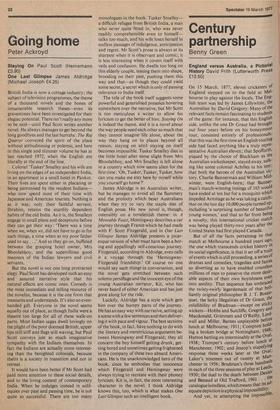Going home
Peter Ackroyd
Staying On Paul Scott (Heinemann £3.90) One Last Glimpse James Aldridge (Michael Joseph £4.25)
British India is now a cottage industry; the subject of television programmes, the theme of a thousand novels and the bones of innumerable research theses—even its gravestones have been investigated for their elegiac potential. There isn't really any more to be said—until Paul Scott writes another novel. He always manages to get beyond the long goodbyes and the last hurrahs: The Raj Quartet conveyed the spirit of the place without attitudinising or polemic, and here in this single and slimmer volume he has at last reached 1972, when the English are literally at the end of the line.
Colonel `Tusker' Smalley and his wife are living on the edges of an independent India, in an apartment in a small hotel in Pankot. Their lives are spent either in placating or being patronised by the resident Indians— who now spend most of their time with Japanese and American tourists. Nothing is as it was; only their faithful servant, Ibrahim, retains the sturdity dependent habits of the old India. As it is, the Smalleys engage in small plans and deceptions before they can get their way: 'There was a time when we, when we, did not have to go in for such things, a time when as my poor father used to say. ...' And so they go on, buffeted between the grasping hotel owner, Mrs Bhoolabboy, and the supercilious good manners of the Indian lawyers and civil servants.
But the novel is not one long protracted elegy. Paul Scott has developed such an easy and assured narrative style that his natural effects are comic ones. Comedy is the most immediate and telling resource of the novelist, because it is the one form that measures and understands. It's also an evenhanded gift. Everyone in the novel seems equally out of place, as though India were a theatre too large. for all of these walk-on parts. Most Indian sagas dwell lovingly on the plight of the poor doomed British, upper lips still stiff and flags still waving, but Paul Scott conveys just as much imaginative sympathy with the Indians themselves. In fact the Indians are actually more interesting than the benighted colonials, because theirs is a society in transition and not in retreat.
It would have been better if Mr Scott had paid more attention to these social details, and to the living context of contemporary India. When he indulges instead in soliloquies over past and passing time, he is not quite so successful. There are too many monologues in the book. Tusker Smalley— a difficult refugee from British India, a man who never quite fitted in, who was never readily comprehensible even to himself— talks too much, and his wife loses herself in endless passages of indulgence, anticipation and regret. Mr Scott's prose is always at its sharpest when it is observant and comic; it is less interesting when it covers itself with veils and confusion. He dwells too long on this elderly couple, teasing them into shape, brooding on their past, pushing them this way and that—as though they could yield some secret, a secret which is only of passing relevance to India itself.
The title of the book itself suggests some powerful and generalised presence hovering somewhere over the narrative, but Mr Scott is too meticulous a writer to allow his lyricism to get the better of him. Staying On is indeed the theme, and it is a novel about the way people need each other so much that they cannot imagine life alone, about the way they hang on to places beyond all reason, staying on until staying on itself becomes impossible. Tusker Smalley dies in the little hotel after some slight from Mrs Bhoolabhoy, and Mrs Smalley is left alone in a country which now seems alien for the first time: 'Oh, Tusker, Tusker, Tusker, how can you make me stay here by myself while you yourself go home?'
James Aldridge is an Australian writer, but he manages to avoid all the flummery and the prolixity which beset Australians when they try to vary the staple diet of English prose. His new novel is, though, ostensibly on a novelettish theme: in A Moveable Feast, Hemingway describes a car journey through France which he had made with F. Scott Fitzgerald, and in One Last Glimpse James Aldridge presents a picaresque version of what must have been a boring and appallingly self-conscious journey. Fitzgerald, according to Aldridge, even calls it a voyage through the 'HemingwayFitzgerald friendship.' Of course no one would say such things in conversation, and the novel gets stretched between such solemn persiflage and the innocent eye of the young Australian narrator, Kit, who has never heard of either American and has just gone along for the ride.
Luckily, Aldridge has a style which gets him over the bumpy parts of the journey. He has an easy way with narrative, setting up a scene with a few sentences and then delivering it with pace and vigour. The best sections of the book, in fact, have nothing to do with the literary and meretricious arguments between Hemingway and Fitzgerald; they all concern the boy himself getting drunk, getting bored and sometimes getting frightened in the company of these two absurd Americans. He is the unacknowledged hero of the book, since he embodies that innocence which Fitzgerald and Hemingway were always trying to recreate with their phoney lyricism. Kit is, in fact, the most interesting character in the novel. I think Aldridge knows this, too, which is What makes One Last Glimpse such an intelligent book.


































 Previous page
Previous page